Rob Reiner‘s The Bucket List (Warner Bros., 12.25), the Jack Nicholson-Morgan Freeman movie about dying from cancer but also getting to fly around the world in a private jet, has been flunked by the Rotten Tomatoes chorus. It managed only a 48% positive (and if you read the presumably positive red-tomato reviews you’ll realize they’re half-and-halfers at best).
Best slam quotes: (1) “Any moron can make a bad movie, but it takes a special breed of schemer to make a picture as shameless as The Bucket List — Salon‘s Stephanie Zacharek; (2) “It”s a picture about two cancer patients confronting reality, and deciding how they want to spend their presumed last days, that has not an ounce of reality about it…Ikiru for meatheads” — Variety‘s Todd McCarthy; and (3) “Hollywood rarely makes movies about the dying wishes of poor people, since that might actually teach something about life lived to the fullest without global traveling…seeing this movie is not something you need to do before you die.” — Metromix‘s Matt Pais.
I’ve said before I don’t think it’s awful — its just tired and perfunctory. It wouldn’t have been made if Warner chief Alan Horn hadn’t given the green-light, which was primarily based on his long friendship with Reiner. (It doesn’t make him look very sage as he prepares to surrender administrative power to Jeff Robinov.) I will say that the CG shot of Nicholson and Freeman sitting on one of the great Egyptian pyramids struck me as half-decent, except for the closeups.
Day: December 25, 2007
Finke on grim strike outlook
Another strong indication that the WGA strike is going to drag on and on and that the Golden Globe and the Oscar award telecasts are more or more likely to be unscripted and shorn of strike-honoring movie stars has come from Deadline Hollywood Daily‘s Nikki Finke in a 12.24 posting:
“The CEOs are deeply entrenched in their desire to punish the WGA for daring to defy them by striking and to bully the writers into submission on every issue, and [think] that the writers are sadly misguided to believe they have any leverage left.
“I’m told the CEOs are determined to write off not just the rest of this TV season (including the Back 9 of scripted series), but also pilot season and the 2008/2009 schedule as well. Indeed, network orders for reality TV shows are pouring into the agencies right now. The studios and networks also are intent on changing the way they do TV development so they can stop spending hundreds of millions of dollars in order to see just a few new shows succeed.
“As for advertising, the CEOs seem determined to do away with the upfront business and instead make their money from the scatter market. I’m sorry to break this disappointing development right before Christmas, but I pledged to stay objective in my reporting and I can’t ignore this major news development. The truth often hurts. But don’t blame the messenger. And, no, this info wasn’t dumped in my lap, either. (That only happens over at Variety or the Los Angeles Times…).”
Rocchi’s “War” review
“There’s subtlety, and then there’s invisibility. Charlie Wilson’s War director Mike Nichols offers us champagne-sparkle charm and whimsy and aw-shucks hijinks. If a film really wants to tackle the covert actions of the Cold War and their long-term consequences, it needs to provide short sharp shots of truth as raw as whiskey, one after the other. [Instead] we get the buzzy, boozy, bonhomie of Charlie’s crusade.

“What Nichols has done is eliminate the historical hangover of unintended consequences. Charlie Wilson’s War is timid where it should be reckless, clever where it should be cutting, funny where it should be fierce.” — from James Rocchi‘s 12.21 Cinematical review.
Digital storage costs
The trend of more and more movies being made digitally is, according to a 12.23.07 N.Y. Times story by Michael Cieply, a storage problem. Key sentence: “Suddenly the film industry is wrestling again with the possibility that its most precious assets, the pictures, aren’t as durable as they used to be.”
It’s all there in dollars and cents, Cieply says, in a study called “The Digital Dilemma” that was released last month. The subject is the digital archiving of movies, written by the science and technology council of the Academy of Motion Picture Arts and Sciences.
“Busy walking, or dodging, the picket lines, industry types largely missed the report√ɬ¢√¢‚Äö¬¨√¢‚Äû¬¢s startling bottom line,” he writes. “To store a digital master record of a movie costs about $12,514 a year, versus the $1,059 it costs to keep a conventional film master.
“Much worse, to keep the enormous swarm of data produced when a picture is ‘born digital’ — that is, produced using all-electronic processes, rather than relying wholly or partially on film — pushes the cost of preservation to $208,569 a year, vastly higher than the $486 it costs to toss the equivalent camera negatives, audio recordings, on-set photographs and annotated scripts of an all-film production into the cold-storage vault.”
Godzilla building in Tokyo
I missed this idea from Ironicsan’s David Friedman when it was first posted on 12.4.06, but it’s a seriously cool idea that Tokyo’s city fathers should absolutely run with: “The people of Tokyo should construct a giant building shaped like Godzilla. Imagine what it would do to the city’s skyline, and to the tourism industry. People would come from all over to take pictures.
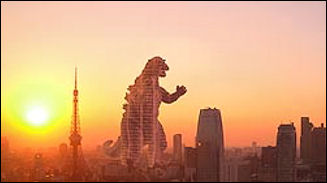
“His eyes could flash red so airplanes don’t hit him. There could be an observatory in his mouth so people could look out over Tokyo. One of his arms could house a bar, and the other arm a restaurant. They could serve drinks called Mothra Martinis and dishes like Grilled Gamera Steaks, with a side of mashed potatoes.
“And conversations could take place like this one (translated from Japanese):
“‘Hey, I just got a new job!’
“‘Oh, really? Where do you work?’
“‘You know the Godzilla Building? I’m just a couple blocks south of there.’
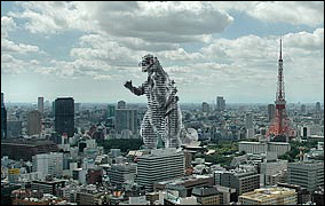
“Or maybe it could be partially residential. And then people could talk about that famous artist who used to live in the Godzilla Building in the apartment right above Godzilla’s left nipple. And then they could argue over whether or not Godzilla even has nipples.”
Of course, being a reptile, he doesn’t.
Scott’s “Pearl Habor ” review
One of the finest opening paragraphs in the history of movie reviewing came from N.Y. Times critic A.O. Scott in his 5.25.01 review of Michael Bay‘s Pearl Harbor: “The Japanese sneak attack on Pearl Harbor that brought the United States into World War II has inspired a splendid movie, full of vivid performances and unforgettable scenes, a movie that uses the coming of war as a backdrop for individual stories of love, ambition, heroism and betrayal. The name of that movie is From Here to Eternity.”
Michael Kidd’s “Smile” performance
Three things about Michael Kidd, the award-winning choreographer (Guys and Dolls and Can-Can on stage, The Band Wagon and Seven Brides for Seven Brothers in films) who died Sunday night at his home in Los Angeles. One, he was straight. Two, he talked like a New York cab driver or newsstand vendor. And three, he gave a snappy and amusing performance as a choreographer hired to finesse a stage show for a Santa Rosa teenage beauty pageant in Michael Richie‘s Smile (’75).
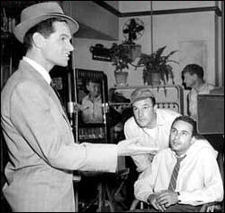
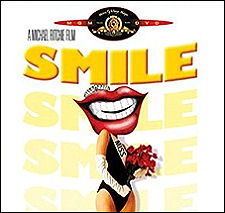
(l. to r.) Michael Kidd, Gene Kelly, Stanley Donen on the set of It’s Always Fair Weather; cover art for DVD of Michael Ritichie’s Smile
It’s worth renting or buying this DVD regardless, but Kidd’s performance has a lot of sass. His character has one of those “okay, let’s get this over with” attitudes of an old veteran on the downslide. I love guys like that, and I liked Kidd the second he walked on-screen in this very dry satire of middle-class culture. Seen it all, knows it all, cut the crap, whatever.
Character traits of Oscar-winning characters
At the end of the day, voting for a Best Actor performance is a vote for the character, as in “I’d like to know that guy or at least have a drink with him” or “I may not like this guy, but I understand why he acted as he did and I respect him for that.” What Best Actor Oscar winner has played a character who didn’t impress viewers in one of these two ways?
A Best Actress vote comes from a similar but somewhat different place. People vote for this or that female character, yes, but mainly they vote for her inner strength, moxie, emotional givingness, fortitude. They vote, in short, for female characters whom they’d like to have as their mothers or loyal best friends. But it’s not necessarily about having a drink. I would have loved to sip a Jack Daniel’s with Erin Brockovich or or Judy Holliday‘s character in Born Yesterday, but I’m not so sure I’d want to raise a glass with Scarlett O’Hara or Mrs. Miniver.
Two strikes against Lewis
If Daniel Day Lewis wins his second Best Actor Oscar for There Will Be Blood, he’ll be joining a fraternity of only seven other two-time winners — Marlon Brando, Gary Cooper, Tom Hanks, Dustin Hoffman, Fredric March, Jack Nicholson and Spencer Tracy. As far as I can reason, there are two things working against Lewis joining the club.
One, his Blood character, Daniel Plainview, is a single-minded misanthropic fiend — the person many workaholics fear they might actually be deep down, which is not a pleasant notion. Plainview has a certain malignant burn-through quality, yes, and he really is quite the powerhouse, especially in the beginning, but he lacks the demonic charisma of, say, Anthony Hopkins‘ Oscar-winning Hannibal Lecter. You have to at least half-like a character to vote for the performance.
And two, Lewis is the Terrence Malick of acting, coming back to do Gangs of New York after working as a shoemaker in Florence. Point being, do some actors have an odd grudge over his sparse workload? As in, “I have to work and study and party-whore my ass off to land jobs and sometimes suffer financially for the lack of work, and then Lewis just sweeps in after years of leisurely puttering around in Ireland and Europe and delivers another brilliant performance and gets nominated for an Oscar?” This is a small-minded way of looking at things, but actors, it is often said, are fundamentally children.
Postscript: I got the idea for this item from “loyalfromlondon.” I started my first draft of it with “As loyalfromlondon says” but I didn’t like the way that sounded. So I decided to say thanks at the end but then I forgot because two or three other things came up. Then I post the piece and the London guy writes to complain that he’s been fucked over because I didn’t extend a “thanks.” Twice.
Sagnier & French Playboy
Continuing their mission to persuade every big-name French actress to doff duds (and in the wake of their recent Juliette Binoche coup), the editors of the January 2008 French Playboy have landed Ludivine Sagnier as their latest agent provocateur. Sagnier is best known for her lead role in Francois Ozon‘s Swimming Pool (’03). She was also in Ozon’s 8 Women, Laurent Tirard‘s Moliere, Christophe Honore‘s Love Songs and the recent anthology film Paris, je t’aime.
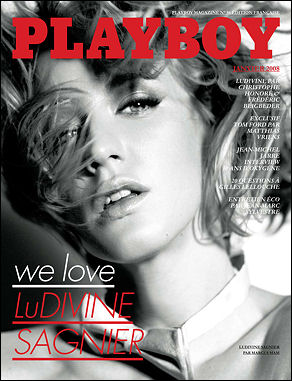
Rob Reiner, mortality and Lee Harvey Oswald
Bucket List director Rob Reiner tells N.Y. Times guy David Halbfinger that he first read the script “with the eyes of a 62-year-old baby boomer increasingly mindful of his own horizons, artistic and otherwise. ‘I like to think of myself as a very young old person,’ Reiner says. ‘But you start thinking, how many years am I going to have to be productive?’ Especially in our business, youth is so stressed. You start thinking, how many more movies am I going to get to make?’ Maybe, if I’m lucky, I’ll make five more.'”
There is only one calculation and one motto for any creative person on this planet: “I am committed to and will make things out of the dreams and visions I have, one way or the other. And I will continue to do so until the day I drop. If that means five months or 50 years now, same difference.” The number of books, songs, paintings, articles, movies, sculptures and scripts you have time to produce is immaterial. There is only what you do, and the certainty that you will do that every day and every week until Lee Harvey Oswald pops his head out of the window and takes that shot, which he will definitely do sooner or later. Until then, it’s clear sailing.
